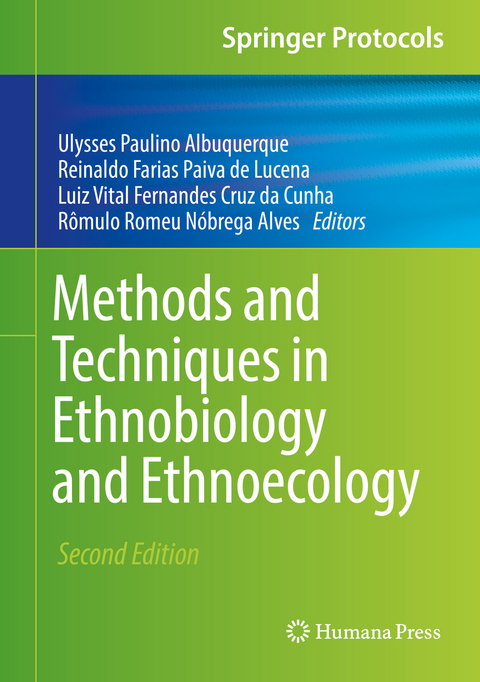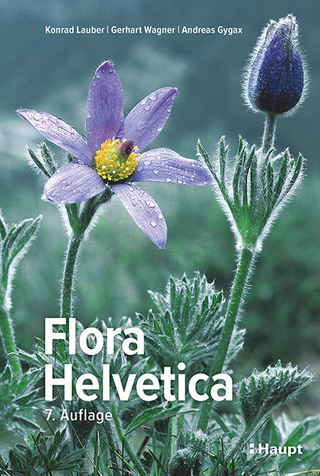
Methods and Techniques in Ethnobiology and Ethnoecology
Humana Press Inc. (Verlag)
978-1-4939-8918-8 (ISBN)
This handbook provides the current state of the art methods and techniques in ethnobiology and ethnoecology, and related fields. This new volume, besides bringing new and original aspects of what is found in the literature, fills some of the gaps in volume one by including the most systematic and extensive treatment of methods and techniques in qualitative research. Along with the various methods covered in the individual chapters, the handbook also includes an extensive bibliography that details the current literature in the field.
Ulysses Paulino Albuquerque is graduate at Biological Sciences from Universidade Federal de Pernambuco, master's at Plant Biology (Taxonomy and Ethnobotany) from Universidade Federal de Pernambuco and PhD at Plant Biology (Ethnobotany) from Universidade Federal de Pernambuco. Currently he is professor of Universidade Federal de Pernambuco (Pernambuco, Northeastern Brazil) where he coordinates the Laboratory of Ecology and Evolution of Social-Ecological Systems (LEA). He acts in the areas of ecological anthropology, ethnobotany, biodiversity conservation, applied botany, ethnopharmacology and natural products. He has a special interest to the comprehension of the factors that modulate the relation between people and biota on the interface of ecology and evolutive processes. He is member of editorial board of the Journal of Ethnobiology and Etnomedicine (Associate Editor), Economic Botany (Associate Editor) and Ethnobiology and Conservation (co-Editor in Chief). Reinaldo Farias Paiva Lucena is graduate at Biological Sciences from Universidade Estadual da Paraiba, master's and PhD at botany from Universidade Federal Rural de Pernambuco. Currently he is professor of Universidade Federal da Paraiba (Northeastern Brazil). He acts in the areas of ethnobotany and environmental sciences. Luiz Vital Fernandes Cruz da Cunha is graduate at Biological Sciences from Universidade Católica de Pernambuco, master's in plant biology at Universidade Federal de Pernambuco and PhD at Forest Sciences from Universidade Federal Rural de Pernambuco. Currently he is professor of Universidade Católica de Pernambuco (Northeastern Brazil), were acts as director of the Institue of Health and Biological Sciences. Rômulo R.N. Alves is graduate at Biological Sciences from Universidade federal da Paraiba, master`s and PhD at Zoology from Universidade Federal da Paraiba. Currently he is professor of Universidade Estadual da Paraiba (Northeastern Brazil). His areas of academic interest are ethnozoology and wildlife trade, uses and conservation, zootherapy, and human ecology. He has conducted ethnobiological research for the last ten years, which focuses on ethnozoology, particularly on fisheries, hunting, and wildlife trade and uses. In addition, he is one of the Editors-in-Chief of the journal Ethnobiology and Conservation and member of the Editorial Board of the Journal of Ethnobiology and Ethnomedicine.
Preface.- Overview.- Preparation of qualitative research.- Execution of the qualitative research.- Participant observation and Field Journal.- Audio and video recording techniques for ethnobiological research.- Discourse of the collective subject as a method for analysis of data in ethnobiological research.- Qualitative data analysis.- The meta-analytical and macroecological approach of Ethnobiology.- Collection and analysis of risks associated with environmental changes.- Sensitivity to harvesting and local risk indexes in ethnobotanical research.- The use of multivariate tools in the study of traditional resource management systems.- Multidimensional analysis for testing conservation, ecological and ethnobiological hypotheses.- Ethnoecology in pluricultural contexts.- Ethnobotany and ethnoecology applied to historical ecology.- Biocultural collections.- Accessing the traditional knowledge on the use of cryptogams.- Ethical considerations and protocols in ethnoecological and ethnobiological research.- Challenges in ethnozoological research.- Methodology applied to geographical indication.- Recent advances in research methods and techniques.- Chemical profile and antioxidant activity of natural products.-Collection and extraction of fatty acids from animals and their possible applications in ethnopharmacological research.- Advanced methods in the chemical analysis of medicinal plants.- Population ecology of plant species submitted to extractivism.- Methods for measuring hunting pressure.- Rapid sampling techniques for vertebrate fauna.- Techniques for analyzing the sustainability of hunting.- Description of technological processes for optimization and enhancement of local uses.- Index.
| Erscheinungsdatum | 19.11.2018 |
|---|---|
| Reihe/Serie | Springer Protocols Handbooks |
| Zusatzinfo | 24 Illustrations, color; 18 Illustrations, black and white; XVI, 342 p. 42 illus., 24 illus. in color. |
| Verlagsort | Totowa, NJ |
| Sprache | englisch |
| Maße | 178 x 254 mm |
| Themenwelt | Naturwissenschaften ► Biologie ► Botanik |
| Sozialwissenschaften ► Ethnologie | |
| Sozialwissenschaften ► Soziologie | |
| Schlagworte | Biocultural collections • ethnobiology • ethnobotany • ethnoecology • traditional knowledge |
| ISBN-10 | 1-4939-8918-9 / 1493989189 |
| ISBN-13 | 978-1-4939-8918-8 / 9781493989188 |
| Zustand | Neuware |
| Haben Sie eine Frage zum Produkt? |
aus dem Bereich


